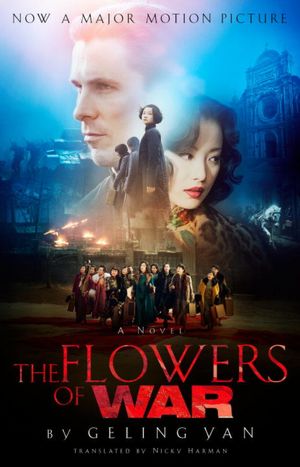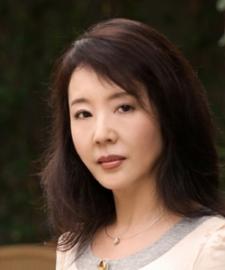Book Review: Celebrating “The Flowers of War”
A strange mix of characters who all have complicated pasts gives rise to a novel that blossoms—exactly as a flower does—into a complex drama that includes several points of view and a wide range of emotions.
The Flowers of War by Geling Yan. Translated from the Chinese by Nicky Harman. Other Press, Paper, 256 pages, $15.95.
By Roberta Silman
Although among the many atrocities of the twentieth century, the massacre in the Chinese city of Nanking, known thereafter as the Rape of Nanking, in December 1937 has been eclipsed by the events that overlapped with and followed it: the killing of six million in Europe now known as the Holocaust and the bombings of Hiroshima and Nagasaki in the Pacific theatre at the end of World War II. But that invasion of Nanking by the Japanese Army and its total indifference to the rules of the Geneva Convention was one of the great tragedies in Chinese history. Between 250,000 to 300,000 people were killed, depending on how you are counting, and many of them were civilians subjected to extraordinary brutality that involved rape and torture.
Now the award-winning, Chinese novelist and screenwriter, Geling Yan has concentrated her considerable gifts on the Rape of Nanking in her latest novel, which has also been made into a movie starring Christian Bale and directed by Zhang Yimou (Ju Dou, Raise the Red Lantern, Hero, House Of Flying Daggers). She begins her tale, which could be one of hundreds and was inspired by a true story, through the eye of a young, Chinese girl Shujuan who is supposedly safe within walls of the St. Mary Magdalene Mission owned by the Catholic Church and run by an American named Father Engelmann who has lived in China for many years. Persuaded by the parents of these eight girls to give them shelter, Engelmann and his assistant, Fabio, are hard pressed to keep them fed and clothed and occupied as the Japanese roam the streets of Nanking.
Their troubles increase geometrically when a group of prostitutes from a nearby brothel climb over the wall. The priest now has the dilemma of keeping the two groups of females apart: the girls stay in the attic and the prostitutes go into the cellar which
has been transformed into an underground brothel. . . . the prostitute called Jade was plucking her eyebrows in front of a little heart-shaped mirror. The women’s furs lay strewn around, and the hooks on which sausages and hams had once hung had been wrapped in the silver paper from cigarette packets and festooned with a garish assortment of scarves, wraps and brassieres.
When one of the courtesans objects to how they are being treated, Yumo, their spokesman because she is the most notorious among them, urges her to let it go
“Because these people have allowed us to stay in this rathole. Because they’re prepared to put up with us. Because we’ve got no face to lose. Because when we’re alive, we’re less than human, and when we die, we’re less than demons. Because we can be beaten and humiliated by anyone at will.”
Although much of what Yumo predicts does happen, some of her ideas are turned on their head. For, unbeknownst to Engelmann and Fabio, there is also another stray within the mission’s walls, a wounded Chinese officer named Dai who finds himself the object of Yumo’s desire, the linchpin in an unexpected love triangle, and the audience for the beleaguered Father Engelmann, who tells Dai
‘”[God] wanted me to save myself by saving others. God wants people to help each other especially when they are injured or weak. I hope you will trust in God. It is God you should trust, not weapons, when you are powerless to control your fate, as you are now.”
This strange mix of characters who all have complicated pasts gives rise to a novel that blossoms—exactly as a flower does—into a complex drama that includes several points of view and a wide range of emotions. In trenchant prose that makes its various points with a remarkably light touch, Yan depicts scenes that lurch from the funny to the touching to the cruel, braiding the fates of these characters deftly and believably until the inevitable, surprising, and heart-wrenching conclusion.
While this is yet another novel of bearing witness to the horrors of war, it is also a peek into a culture that westerners find will find puzzling. Here is Yumo, explaining how she became what she is to Fabio:
“I’m the eldest. I have two younger sisters and a little brother. Before my mother became an [opium] addict, I was just like those schoolgirls. I went to a good school, I was at a missionary school for a year.”
She told him briefly how she had been pawned to a distant relative as a child, and how that relative’s wife had finally sold her on to the Nanking brothel. She spoke in a flat, dull monotone as if what she was saying was quite ordinary. She told him about the humiliation of being unjustly accused of stealing the scissors, and how the incident had made her determined to get to the top, even of this degrading profession.
Yet it is she who becomes the hero of this novel, the leader of the flowers of war, who, in defiance of all that the Japanese have done, emerge triumphant—a wonderful illustration of the resilience and strength of the human spirit in the most extreme of circumstances. I will never forget some of the characters in this short novel for their amazing acceptance of their destiny and their dignity throughout. That she was able to convey this with so much authority yet so simply is testament to Yan’s splendid talent. I hope the movie does her justice.
Roberta Silman is the author of Blood Relations, a story collection, three novels, Boundaries, The Dream Dredger and Beginning The World Again, and a children’s book, Somebody Else’s Child. She can be reached at rsilman@verizon.net.
Tagged: Chinese, Christian Bale, Geling Yan, Other Press, Rape of Nanking, The Flowers of War


